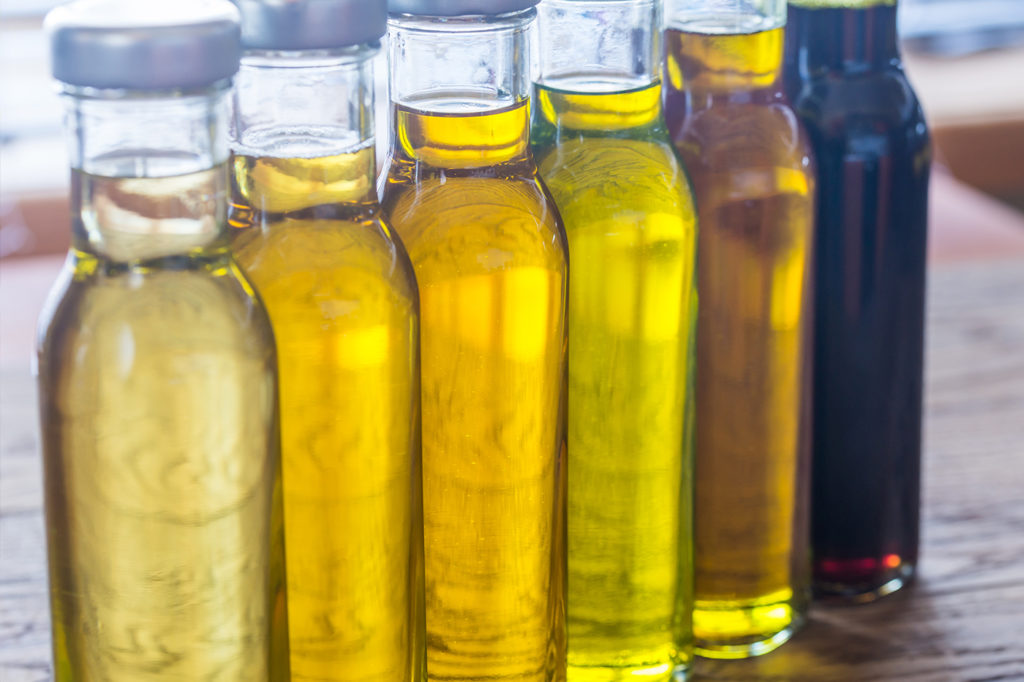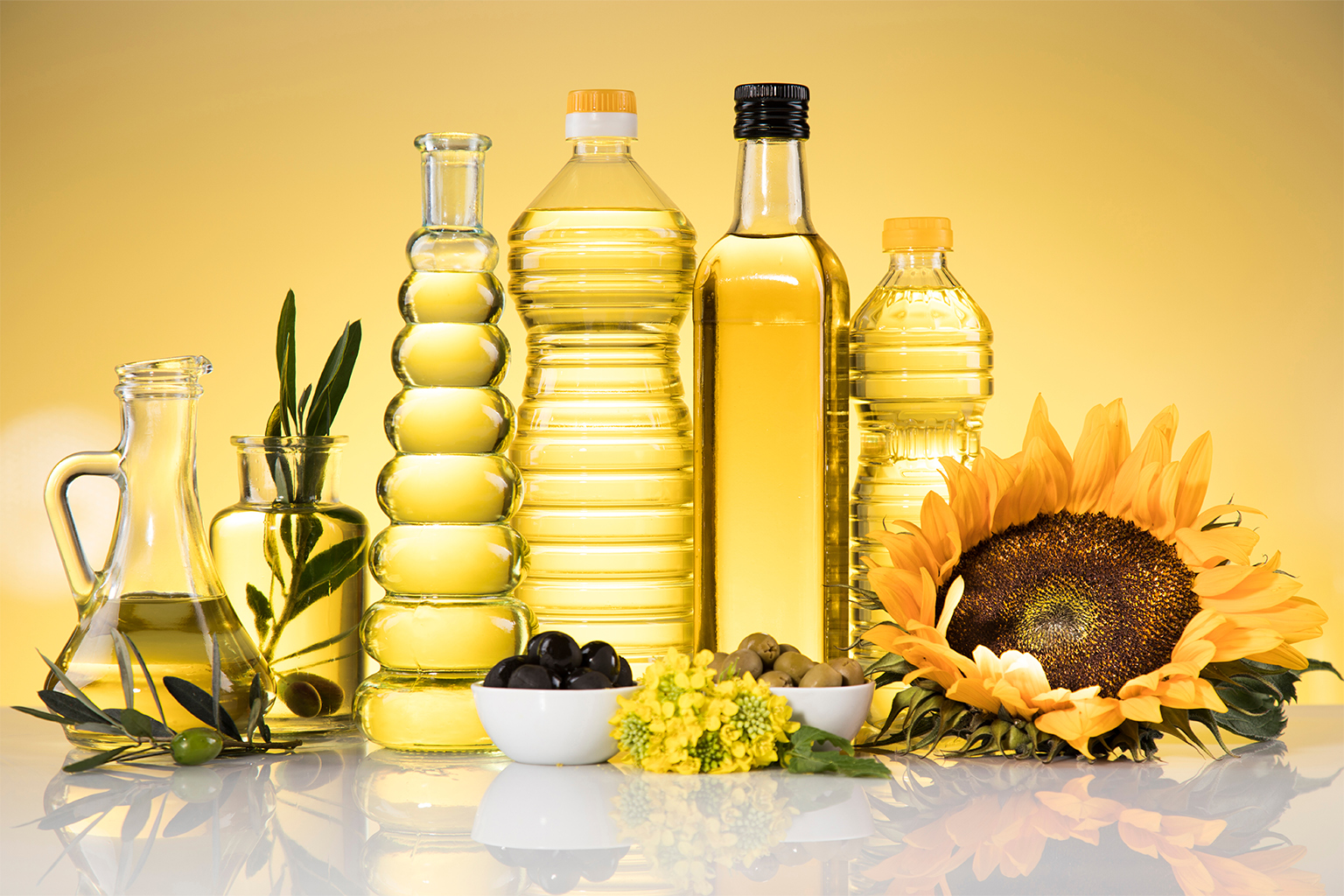Olive oil and sunflower oil: types, production, and environmental impact
What are the differences between organic oils and conventional oils when it comes to human health and the environment? What are the specific features of olive, pomace, EVO and sunflower oil? What kind of information about oils are consumers most interested in? If you’d like to read the answers to these questions, stick around and we’ll clear up all your doubts. We’ll also update you on the latest key studies on olive oil – both extra-virgin and conventional – and sunflower oil.
Aside from their price, organic and non-organic oils may seem similar at first glance. But the truth is there are big differences between them in terms of production processes, including fertilization and pesticide use, which affect the quality of the final product as well as its impact on the environment.
Main differences between organic and conventional oils
Now, let’s look at the main features of both organic and conventional – also known as traditional – oils, and the differences between them.
Production
Organic oils are produced without the use of synthetic chemical products like pesticides and fertilizers. This also applies to the field where the crops are grown, meaning that organic producers must not have used chemical products for at least 3 years before the crops are planted.
But that’s just the first of the requirements to which sustainable organic producers must comply. For organic olive oil production, the olive trees must be well separated, and should have no plants around them which could steal nutrients and water from the olive tree itself. Traditional production tries to prevent the growth of invasive plants by using herbicides which can harm the environment and the health of workers and consumers.
If a producer’s goal is to achieve 100% sustainable soil in olive groves, vegetation cover is usually used to prevent soil erosion and improve fertilization. To prevent the growth of weeds, one of the most common strategies is to use chopped tree prunings, which help improve the olive tree’s capacity to absorb water.
Fertilization and pest control
To get a great product the soil must be of optimal quality. And, for organic oils, fertilizers should be natural. These include manure, composted production wastes, and other fertilizers that comply with current legislation. In conventional cultivation, chemical fertilizers are generally used. These include potassium, phosphorus, sulphur, and a range of other chemicals.
Organic companies cannot use conventional pesticides and fungicides – also known as synthetic chemicals – to fight pests and disease, as these are prohibited in organic farming.
Processing
Organic oils are processed in a gentler, more natural way, using mechanical or thermal methods, avoiding the use of chemical products and techniques like refining or blending. Only cleaning products that have been judged suitable by the Organic Agriculture Committee may be used, and their components must be of biological origin. If a company carries out organic and conventional production, the processes of each must be kept separate.
Non-organic oils are often processed with synthetic chemicals that can affect the quality of the oil and increase the amount of toxic waste produced during the process.
Nutritional quality
Organic oils usually have a higher nutritional quality than non-organic ones. Because production and processing are carried out without the use of chemical products, organic oils preserve more beneficial nutrients and antioxidants. In addition, organic oils tend to have a more intense and authentic flavour.
One study, published in the magazine Food Chemistry in 2014, compared the nutritional profile of organic and non-organic virgin olive oils and found that organic oils had a higher number of phenolic compounds, antioxidants, and monosaturated fatty acids, all of which are beneficial for heart health.
Another study, published in the journal PLoS ONE in 2013, compared the nutritional quality and presence of contaminants in organic and non-organic sunflower oils. The researchers found that organic oils contained fewer contaminants, like pesticides and heavy metals, and had a higher concentration of antioxidants and beneficial fatty acids.
Environmental impact
The production of non-organic oils often has a negative effect on the environment. Chemicals used during production can contaminate soil and water, which can impact local flora and fauna. Furthermore, the production of non-organic oils often involves the use of large amounts of energy and fossil fuels, which contribute to climate change.
There are many scientific studies that suggest that the production of organic olive oil and organic sunflower oil has less of an environmental impact than that of conventional oils. One such study, published in the journal Environmental Science and Pollution Research in 2018, analysed the environmental impact of organic and conventional oil production in Spain. Researchers found that organic olive oil production has lower environmental impacts in terms of water use, greenhouse gas emissions, and energy consumption, when compared to conventional production.
Another study, published in the magazine Science of the Total Environment in 2019, analysed the different environmental impacts of organic and conventional sunflower oil production in Bulgaria. Researchers found that organic sunflower oil production has a lower environmental impact in terms of water use and greenhouse gas emissions, and reduced environmental toxicity thanks to the absence of pesticides and chemical fertilizers.
However, it is important to note that each case may vary depending on the production location and the specific methods used to produce the oil.
Information for the consumer about organic oils:

Growing numbers of people are committed to eating more healthily and to consuming products that respect the environment. By providing consumers with key product information, you can contribute to more responsible and conscious consumption. Below, we outline some of the key features you should highlight on your packaging or marketing materials if you produce or market organic oil:
- No allergenic ingredients, in accordance with current legislation.
- This product has not been genetically modified (GMO).
- This product complies with the requirements of applicable European and national legislation.
- Provide information about the eco-label.
- Outline the scientifically proven health benefits.
- Provide common uses in the kitchen.
- Outline the benefits of responsible organic farming practices.
- Provide recommendations for consumption and storage (generally, consume within 12 months and store in a cool dry place)
Bestselling types of olive oil:

Extra Virgin Olive Oil (EVOO)
Widely considered the best variety of olive oil.
EVOO provides the most health benefits of any olive oil.
According to a study by the UJA, led by Dr Gaforio: “Diets that use EVOO achieve an increase in the leptin hormone, favouring an anti-inflammatory state, which, in Gafori’s opinion, is very useful for preventing chronic diseases.”
Another of the results obtained corroborates that EVOO has a thermogenic effect, the same one that prevents the human body from accumulating fat.
The extraction process is carried out at a low temperature of around 27 degrees Celsius. The oil has low acidity, with a maximum of 0.8 grams of oleic acid per 100 grams of oil, and a fruity, medium or intense flavour, with a slightly bitter, spicy touch, which are three well-known positive attributes of the oil. The colour is usually a deep green.
Virgin Olive Oil
It usually has some defects in its organoleptic properties and slightly higher acidity, with a maximum of 2 grams of oleic acid per 100 grams of oil.
There is a variety of virgin olive that is not suitable for human consumption. It is called Lampante Virgin Olive Oil and it has an acidity greater than 3.3 percent and other qualities that make it unmarketable. However, this variety can be refined until its maximum acidity is 0.3 grams per 100 grams of oil, although in this case the refined oil will not have organoleptic properties such as smell or taste.
Olive Oil
A mixture of refined olive oil with virgin olive oil, used to improve its organoleptic properties. It is of a reduced quality and its acidity does not exceed 1%.
Olive Pomace Oil
Obtained by using solvents and other chemical agents on the remaining mass of virgin olive oil production that would otherwise be thrown away. It has different organoleptic properties but is suitable for consumption since any trace of solvent is removed by high temperatures, without leaving residues.
Bestselling types of sunflower oil:
Virgin sunflower oil
This type of oil is obtained naturally through a mechanical process at low temperatures, without the use of additives. Due to its extraction method, it preserves its original properties and nutrients better than other types of sunflower oil.
Refined sunflower oil:
The most-used oil in kitchens around the world. It goes through a refining process to lighten it and make it healthier. However, this process can also affect its original properties and nutrients.
Sunflower oils can be classified according to their level of oleic acid:
High oleic sunflower oil:
This is a type of modified oil that is characterized by having an oleic acid content greater than 75%. This type of oil does not contain trans fats and its structure is similar to that of olive oil, making it a healthy and nutritious alternative.
Mid-oleic sunflower oil:
Contains a level of oleic acid that ranges from 55% to 74%. Although it doesn’t contain trans fats, its oleic acid level is lower than that of high oleic sunflower oil, making it less healthy.
We hope that this guide has helped you learn more about the wonderful world of oil!
If you’d like to find out more about the oil brands that we export at Organic Boosting, don’t hesitate to contact us and we’ll be happy to send you a catalogue, with no obligation on your part.
If you’re interested in creating your own brand, click here and learn all about our bulk sales and private label services.






